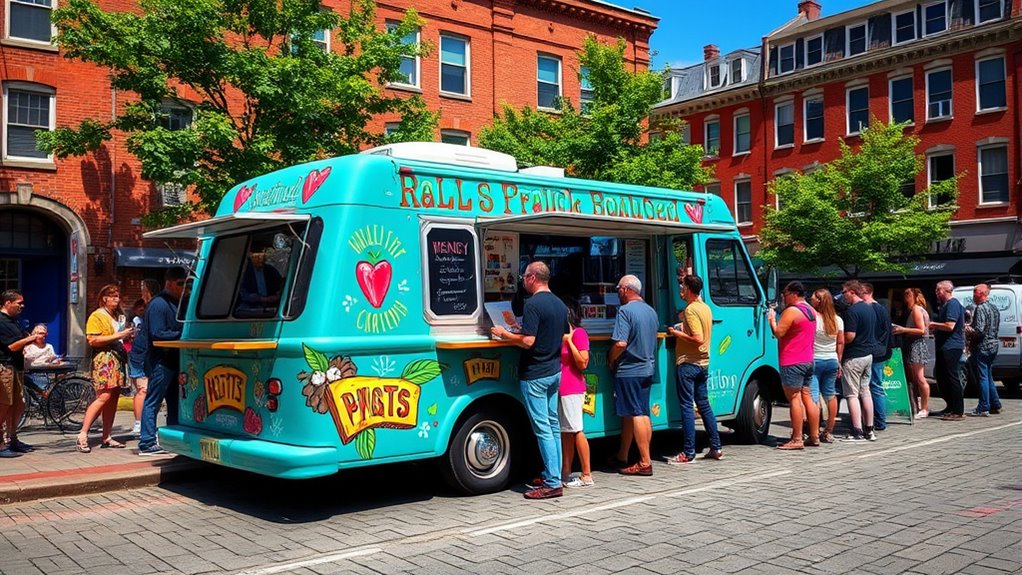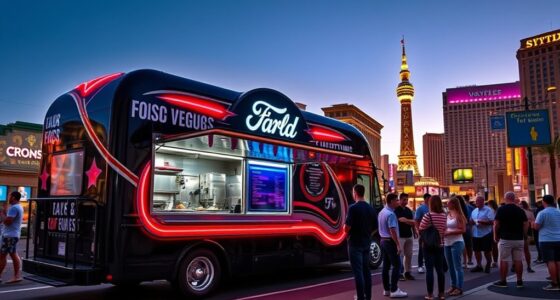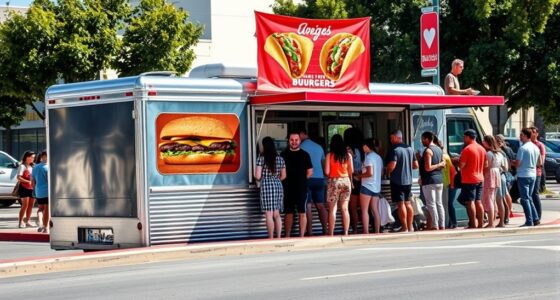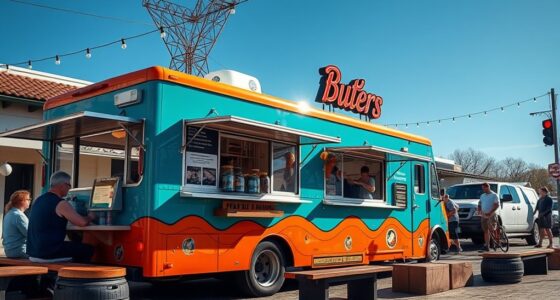To start a food truck in Providence, RI, you need to understand local permits, health standards, and licensing through the Providence Department of Planning and Development. Embrace emerging culinary trends like fusion cuisine, focusing on Instagram-worthy presentations, while sourcing local ingredients to attract health-conscious customers. Investing in branding, technology, and community engagement helps grow your business. Keep building on these steps, and you’ll discover how to create a profitable, standout food truck in Providence.
Key Takeaways
- Obtain necessary permits and licenses from the Providence Department of Planning and Development.
- Develop a diverse, innovative menu incorporating fusion cuisine and locally sourced ingredients.
- Invest in suitable equipment, vehicle branding, and custom kitchen setup within budget.
- Comply with local sanitation standards, maintain proper documentation, and implement regular health procedures.
- Utilize marketing, social media, and community events to promote your food truck and build customer loyalty.
New Culinary Trends Emerging
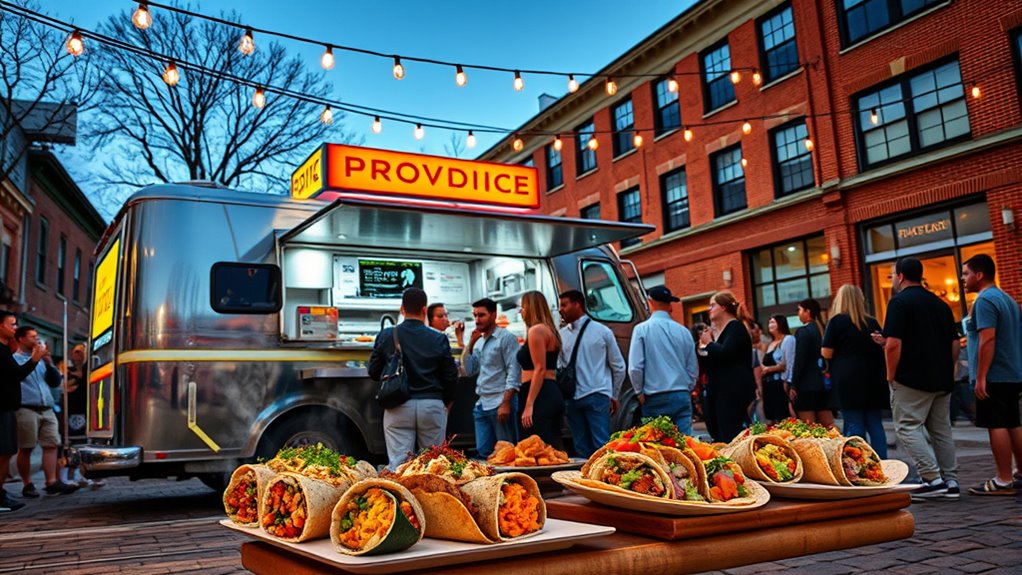
As food trucks continue to gain popularity in Providence, new culinary trends are quickly emerging that reflect changing tastes and innovative cooking techniques. Conducting a food trend analysis reveals a shift toward fusion cuisine, where bold flavor combinations and international influences create exciting menu options. You’ll notice chefs experimenting with culinary innovation, blending unexpected ingredients to craft unique dishes that stand out. Customers are enthusiastic for fresh, Instagram-worthy presentations that showcase creativity. This trend encourages you to think outside the box, incorporating diverse flavors and techniques to appeal to adventurous diners. Staying ahead in this evolving landscape means embracing these culinary innovations, ensuring your food truck offers something fresh, exciting, and aligned with current food trend analysis. Embracing fusion cuisine allows you to stand out by offering distinctive, culturally inspired dishes that excite the palate and attract a broader customer base.
Understanding Local Requirements
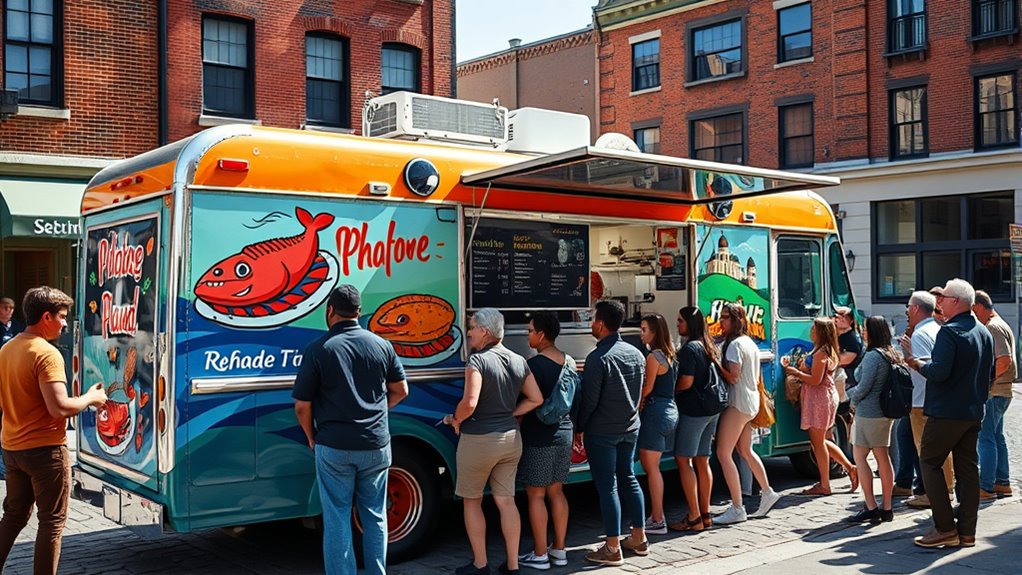
To operate a food truck in Providence, you’ll need to understand the permit process, including obtaining the necessary licenses. You should also familiarize yourself with local sanitation standards and make certain you have all required documentation. Additionally, knowing the designated food truck zones helps you plan your locations and stay compliant with city regulations. Being aware of health and safety regulations is essential to ensure your food truck meets all the necessary standards for operation.
Providence Food Truck Permit Process
Getting a food truck permit in Providence involves understanding the city’s specific requirements and following a clear application process. You’ll need to submit an application to the Providence Department of Planning and Development, including proof of insurance and vehicle registration. The city also requires compliance with local health and safety standards, including parking and operating hours. While the permit process is straightforward, it’s essential to focus on food truck branding to attract customers and stand out. Once approved, you can leverage social media marketing to promote your schedule and menu, helping build a loyal customer base. Keep in mind that renewal requirements may involve additional documentation or inspections, so staying organized ensures a smooth process. Following these steps will help you launch your Providence food truck successfully.
Sanitation Standards and Documentation
Understanding the sanitation standards and documentation required for your Providence food truck is crucial to guarantee compliance with local health regulations. Ensuring proper food safety practices means maintaining cleanliness and submitting the necessary sanitation documentation. Providence requires that you keep records of daily cleaning schedules, pest control, and employee hygiene training. These documents prove your commitment to food safety and help avoid fines or shutdowns. To stay compliant, regularly update and review your sanitation procedures. Here’s a quick overview of key requirements:
| Document Type | Purpose | Frequency |
|---|---|---|
| Food safety training logs | Staff food safety education | Ongoing |
| Cleaning schedules | Maintain sanitation standards | Daily/Weekly |
| Pest control reports | Prevent contamination | Monthly |
| Equipment sanitation logs | Ensure proper cleaning | Per Use |
| Employee hygiene records | Track health compliance | Upon Hiring |
Keeping accurate sanitation documentation is essential for your food truck’s success.
Designated Food Truck Zones
Navigating Providence’s regulations for food truck placement is essential to operate legally and avoid penalties. The city designates specific zones where food trucks can park and serve customers. These zones often require clear food truck signage to identify your business and guarantee compliance. Some areas may permit drive thru options, but you must adhere to specific rules about traffic flow and safety. Check local zoning maps and ordinances to confirm your chosen spot is approved. Additionally, ensure your signage is visible and compliant with city standards. Parking outside designated zones can lead to fines or your truck being moved. By understanding and respecting these designated zones, you’ll stay within legal boundaries and smoothly run your Providence food truck.
Setting Up Your Base of Operations
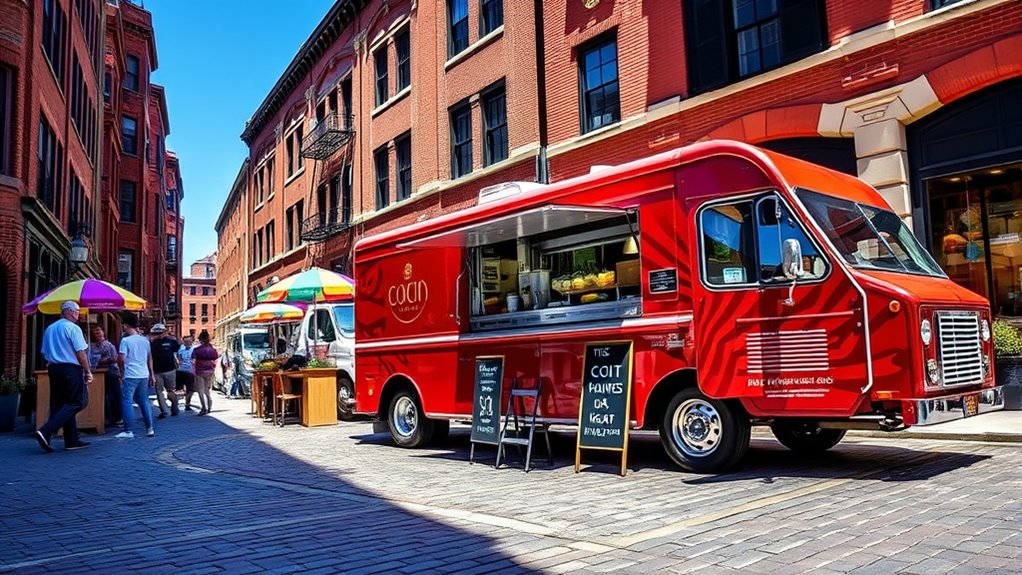
You need to choose a suitable space to serve as your base of operations, and shared kitchen licensing options can make this facilitate. Planning your kitchen layout carefully ensures you meet health regulations and maximize efficiency. Consider how your setup will support your menu and workflow as you get started. Additionally, understanding kitchen licensing options can help you select the most compliant and cost-effective facility for your food truck.
Shared Kitchen Licensing Options
Setting up your food truck’s base of operations often involves choosing a shared kitchen, which can be a cost-effective and flexible licensing option. Shared kitchen licensing allows you to rent space in a commercial kitchen that meets health and safety standards, saving you the expense of building your own facility. Many food truck co-ops operate shared kitchens, providing a collaborative environment where multiple vendors share resources and responsibilities. This setup simplifies licensing since the co-op manages compliance, inspections, and permits, easing your administrative burden. Using a shared kitchen also offers opportunities for networking and cost-sharing. If you’re starting out in Providence, exploring shared kitchen licensing options can streamline your launch and help you meet local regulations efficiently.
Custom Kitchen Layout Planning
Designing a custom kitchen layout is a crucial step in establishing an efficient and compliant food truck operation. Focus on custom kitchen ergonomics to guarantee your workspace minimizes movement and boosts productivity. Proper layout optimization allows you to arrange equipment and storage logically, reducing time spent fetching ingredients or cleaning. Consider your workflow from prep to service, positioning appliances for smooth transitions. Prioritize safety and compliance with local health codes, ensuring fire suppression systems and ventilation are properly integrated. Use compact yet functional designs to maximize limited space without sacrificing accessibility. By carefully planning your layout, you’ll improve efficiency, reduce fatigue, and create a seamless operation that keeps customers satisfied. A well-designed kitchen is the foundation for your food truck’s success in Providence.
Budgeting and Financing Your Food Truck
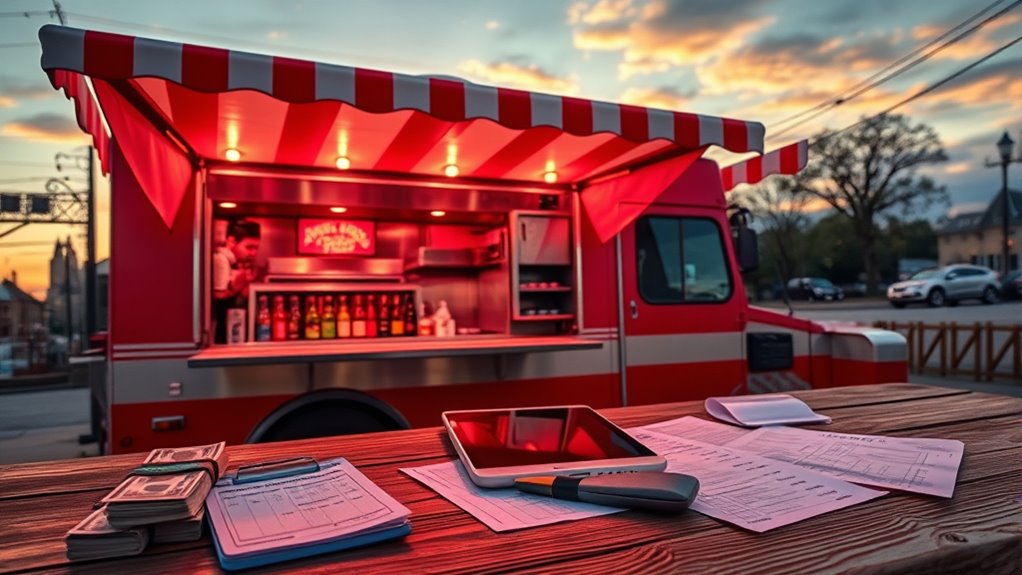
When planning your food truck, you’ll need to consider initial vehicle customization costs and how to cover them. Local small business grants can help ease your financial burden, so it’s worth researching options. Don’t forget to budget for liability insurance, which is essential to protect your business and meet legal requirements. Additionally, exploring animated movies that touch hearts can offer inspiring stories of perseverance and success in entrepreneurship.
Initial Vehicle Customization Costs
Customizing your food truck is a significant investment that can vary widely depending on your needs and goals. Initial vehicle customization costs include essentials like a vehicle wrap, which not only protects your branding but also makes your truck stand out on the streets. Expect to spend between $2,500 and $5,000 for a professional wrap, depending on the design complexity. Additionally, you’ll need custom shelving to optimize space and workflow. The cost for custom shelving can range from $1,000 to $3,000, depending on materials and design. Remember, these are just estimates—your specific needs and choices can influence the total. Proper planning and budgeting for these customization costs ensure your truck is both functional and eye-catching, helping set the foundation for a successful food venture.
Local Small Business Grants
Securing funding for your food truck can be more manageable than you might think, especially with access to local small business grants. These grants can help cover startup costs, equipment, and permits, easing your financial burden. Research available local small business grants in Providence, as many organizations aim to support entrepreneurs like you. Applying for these grants often involves demonstrating your business plan and community impact. Additionally, understanding the Providence food truck permit process is essential; some grants may require proof of compliance. Keep in mind that grants are competitive, so prepare a compelling application. Utilizing local grants can reduce your reliance on loans and personal savings, making your food truck startup more financially sustainable from the outset.
Liability Insurance Requirements
Are liability insurance requirements for your food truck budget-friendly? While it might seem like an added expense, investing in proper liability coverage is essential. It protects you from costly claims and keeps your business running smoothly. When choosing insurance policies, consider:
- The peace of mind knowing you’re covered during service mishaps
- Potential legal costs you’re protected against
- The credibility you build with customers and vendors
Liability coverage varies, but it’s a worthwhile cost to prevent financial ruin. Budgeting for these insurance policies ensures you’re prepared for accidents or damages. Don’t skip this step—adequate liability insurance is critical for your food truck’s long-term success and compliance with Providence regulations.
Designing Your Menu and Pricing Strategy
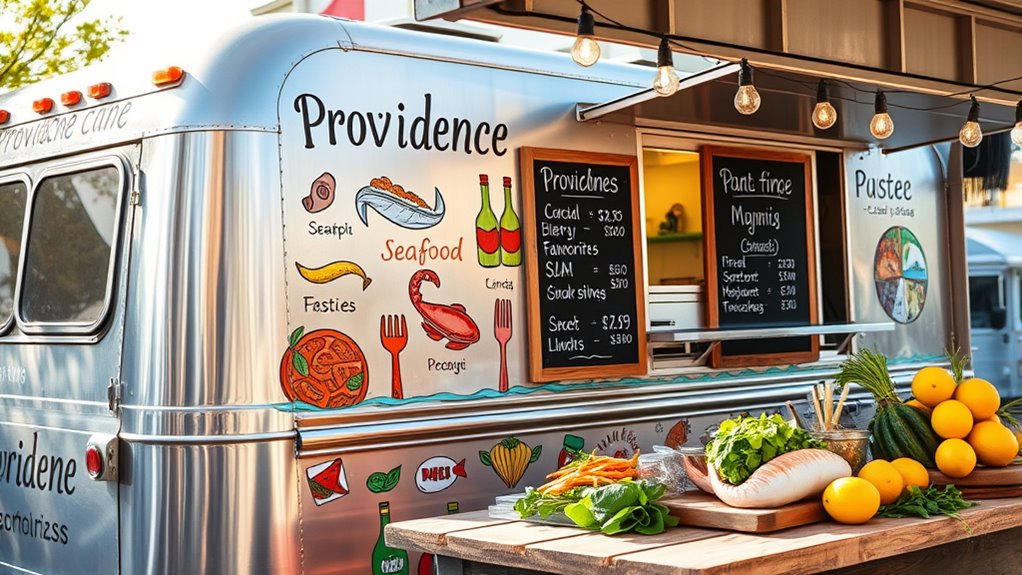
When designing your menu, consider incorporating locally sourced ingredients to appeal to health-conscious customers and support local producers. Keep a close eye on ingredient costs and use cost control techniques to maintain profitability without sacrificing quality. Balancing these factors helps you create a pricing strategy that’s competitive and sustainable in Providence’s vibrant food scene. Utilizing insights from personality assessments can also enhance your team management and customer service approach, ensuring a cohesive and engaging experience for patrons.
Locally Sourced Ingredient Integration
Incorporating locally sourced ingredients into your menu not only supports the community but also appeals to customers seeking fresh, authentic flavors. This approach emphasizes sustainable sourcing and highlights the farm-to-truck concept, giving your offerings a unique edge. When designing your menu, think about ingredients that can be easily obtained from nearby farms, ensuring peak freshness and quality. Visualize vibrant, colorful produce piled high, herbs freshly picked, and meats raised with care. For example:
- Juicy heirloom tomatoes and crisp greens
- Aromatic herbs like basil and thyme
- Locally raised chicken or seafood from Rhode Island waters
These elements create a farm-to-truck experience that resonates with customers and fosters loyalty. Prioritize partnerships with local farmers to ensure consistent, sustainable supply and showcase your commitment to the Providence community.
Ingredient Cost Control Techniques
Effective ingredient cost control starts with thoughtful menu design and strategic pricing. To keep costs in check, focus on ingredient budgeting by selecting dishes that maximize profit margins while minimizing waste. Design your menu around versatile ingredients that can be used across multiple items, reducing inventory needs. Strong supply chain management is essential; build relationships with reliable suppliers to secure better prices and consistent quality. Regularly review your supplier options and negotiate bulk discounts when possible. Be mindful of portion sizes to avoid overuse of expensive ingredients. By carefully planning your menu and pricing strategies, you can control ingredient costs more effectively, ensuring your food truck remains profitable and sustainable in Providence’s competitive market.
Technology and Operations
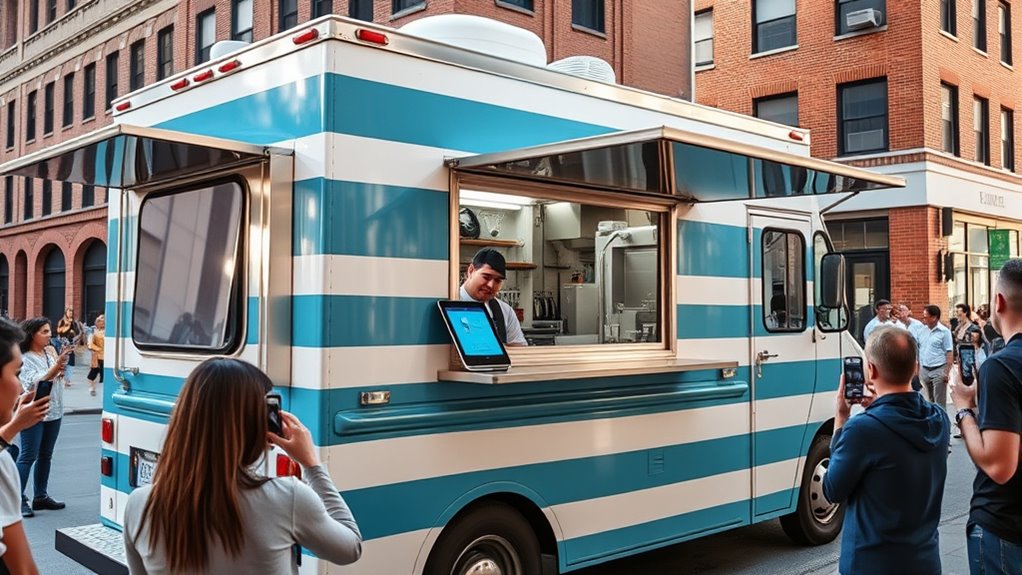
Using wireless EMV chip readers makes accepting card payments quick and secure for your customers. Real-time stock tracking software helps you stay on top of inventory, reducing waste and ensuring popular items are always available. Incorporating these technologies streamlines your operations and keeps your food truck running smoothly.
Wireless EMV Chip Readers
Wireless EMV chip readers have revolutionized payment processes for food trucks by enabling quick, secure transactions without the need for bulky hardware. With wireless EMV, you can accept card payments smoothly, even on the move. These compact chip readers easily connect via Bluetooth or Wi-Fi, giving you flexibility at busy events. Imagine:
- A sleek device clipped onto your countertop, ready to accept payments in seconds
- Customers tapping or inserting their cards effortlessly
- Transactions completing seamlessly, reducing wait times and lines
This technology minimizes fraud risks and guarantees compliance with security standards. Using chip readers, you deliver a professional experience that builds customer trust. Whether you’re serving in Providence’s bustling streets or at festivals, wireless EMV simplifies your payment system and helps keep your operation running smoothly.
Real-Time Stock Tracking Software
Real-time stock tracking software transforms how food trucks manage inventory by providing instant updates on ingredient levels and product availability. With this technology, you can streamline inventory management, ensuring you always know what’s in stock without manual checks. It helps you stay ahead of supply chain disruptions by alerting you when supplies run low, so you can reorder before running out. This minimizes waste, optimizes stock levels, and reduces delays during busy hours. By integrating real-time data, you gain better control over your inventory, ultimately improving customer satisfaction. Plus, it allows you to make informed decisions about purchasing and menu adjustments based on current stock levels. Implementing this software keeps your food truck efficient, responsive, and ready to serve, even during peak times.
Marketing and Growing Your Presence
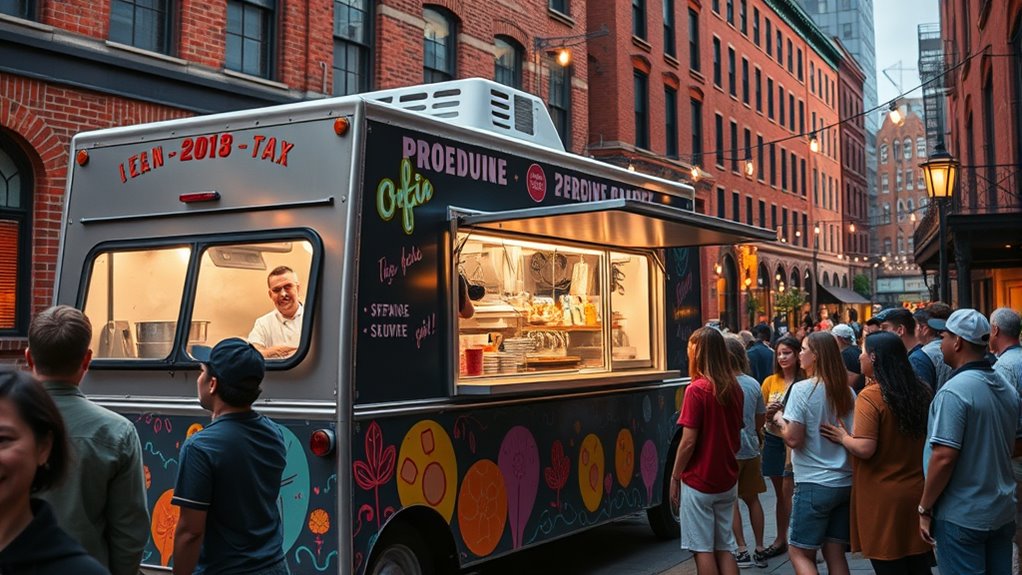
To grow your food truck’s presence, focus on scheduling your events at popular times and locations to attract more customers. Implement customer loyalty programs to encourage repeat visits and build a dedicated following. These strategies can help you stand out in Providence’s busy food scene and keep your business thriving.
Popular Event Scheduling Tips
Scheduling your food truck events strategically is essential for boosting visibility and attracting a steady stream of customers. Choose high-traffic dates and locations that align with your target audience. Leverage food truck branding to make your presence memorable, using eye-catching signage and consistent themes. Incorporate social media marketing by announcing events in advance, creating buzz, and engaging followers with updates and behind-the-scenes content. To help you visualize, consider these strategies:
- Partner with local festivals or farmers’ markets for maximum exposure
- Schedule events during peak lunch and dinner hours to capture more customers
- Use social media to countdown to events, encouraging followers to share and invite friends
Customer Loyalty Programs
Building a strong customer loyalty program is a powerful way to grow your food truck’s presence and encourage repeat business. By focusing on customer engagement, you can turn casual customers into loyal fans. Offer loyalty rewards such as discounts, free items, or exclusive menu access to incentivize repeat visits. Make it easy for customers to participate—use punch cards or digital apps to track their rewards effortlessly. Regularly promote your loyalty program on social media and at your events to boost awareness. When customers see that their loyalty is valued with meaningful rewards, they’re more likely to return and recommend your truck to others. Consistent engagement and rewarding loyalty help you build a dedicated customer base, ensuring sustained growth in Providence’s competitive food scene.
Local Networking Opportunities
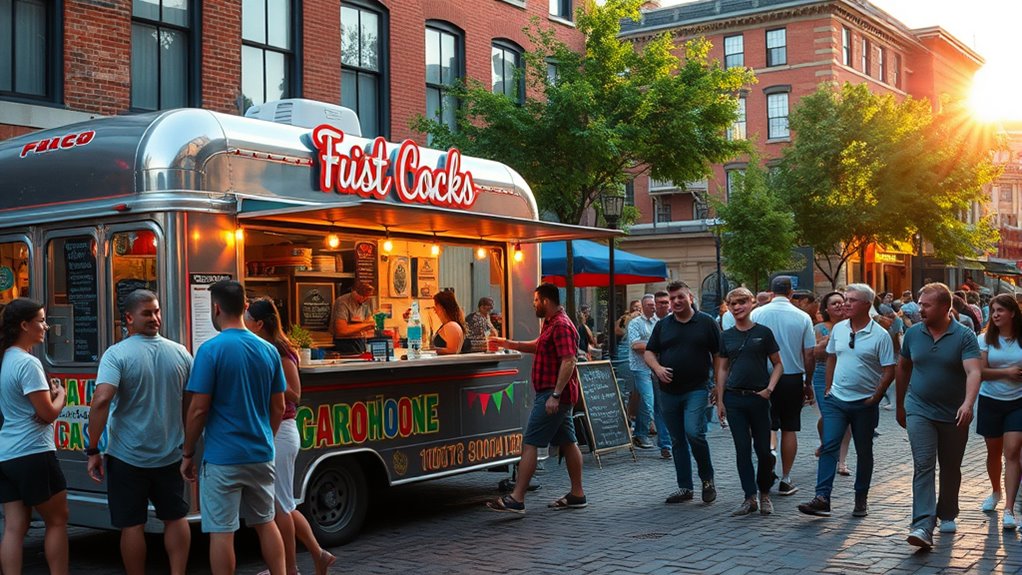
Are you looking to expand your connections within Providence’s vibrant food scene? Tapping into local networking opportunities can boost your visibility and build valuable community partnerships. Attend local food festivals where you can showcase your truck, meet fellow vendors, and engage with food enthusiasts. Join industry-specific meetups or business groups to connect with mentors and potential collaborators. Visualize these moments:
- Sharing a booth at a lively food festival, attracting new customers
- Collaborating with local farmers for fresh ingredients
- Connecting with event organizers to secure regular catering opportunities
These activities help you establish a strong presence, foster community partnerships, and integrate into Providence’s dynamic culinary landscape. Networking isn’t just about sales; it’s about creating lasting relationships that grow your food truck business.
Frequently Asked Questions
What Permits Are Required Specifically for Food Trucks in Providence?
You need to obtain food truck licensing from the Rhode Island Department of Health, ensuring your vehicle meets health department regulations. You’ll also need to secure a mobile food vendor permit from Providence’s city government. Make sure your truck passes health inspections and adheres to local health department regulations. These permits and licenses are essential to operate legally, so start the application process early and stay compliant with all city and state requirements.
How Do Seasonal Weather Changes Impact Food Truck Operations Locally?
Like a boat braving shifting tides, your food truck faces seasonal temperature fluctuations that impact operations. Cold winters can freeze supplies and slow sales, while hot summers bring weather-related operational challenges like overheating equipment or staffing issues. You’ll need to adapt by investing in insulation, cooling systems, and flexible hours. Staying vigilant about Providence’s changing weather helps you navigate these seasonal shifts smoothly, keeping your business afloat year-round.
What Are the Most Popular Food Truck Cuisines in Providence?
In Providence, popular food truck cuisines include seafood, tacos, and ethnic options like Thai or Mediterranean. To succeed, focus on food truck marketing that highlights your unique offerings and seasonal specials. Engage customers through social media updates and promotions, encouraging repeat visits. By actively connecting with your audience and showcasing your menu’s freshness, you’ll boost customer engagement and build a loyal following in this vibrant local scene.
How Can I Find Reliable Suppliers for Ingredients in Providence?
You can find reliable suppliers for ingredients in Providence by connecting with local farm partnerships and exploring wholesale produce sources. Visit farmers’ markets and ask vendors for recommendations. Search online directories for wholesale produce distributors in your area. Building relationships with local farmers guarantees fresh ingredients and better prices. Additionally, join local food entrepreneur groups to get insider tips on trusted suppliers and stay updated on seasonal offerings.
Are There Any Local Food Truck Events or Festivals to Participate In?
Imagine you’re living in the 1920s while planning your Providence food truck debut! Providence hosts lively food truck festivals and events, perfect for boosting your visibility. To succeed, leverage food truck marketing strategies and social media promotion, engaging local audiences. Participating in events like the Providence Food Truck & Craft Beer Festival can help you connect with customers and build your brand. Don’t miss these opportunities to make your truck a local favorite!
Conclusion
Starting a food truck in Providence might seem like a sweet gig, but don’t forget—what’s hot today can be cold tomorrow. Ironically, the real challenge isn’t just launching your truck but staying ahead in this ever-changing scene. With the right planning and a dash of perseverance, you’ll turn those culinary dreams into a thriving reality. Just remember, in the food truck world, it’s all about serving up success one spicy step at a time.
